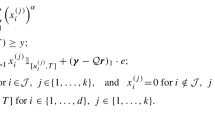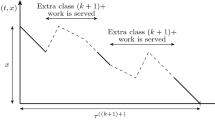Abstract
We consider switched queueing networks in which there are constraints on which queues may be served simultaneously. The scheduling policy for such a network specifies which queues to serve at any point in time. We introduce and study a variant of the popular maximum weight or backpressure policy which chooses the collection of queues to serve that has maximum weight. Unlike the maximum weight policies studied in the literature, the weight of a queue depends on logarithm of its queue-size in this paper. For any multihop switched network operating under such maximum log-weighted policy, we establish that the network Markov process is positive recurrent as long as it is underloaded. As the main result of this paper, a meaningful fluid model is established as the formal functional law of large numbers approximation. The fluid model is shown to be work-conserving. That is, work (or total queue-size) is nonincreasing as long as the network is underloaded or critically loaded. We identify invariant states or fixed points of the fluid model. When underloaded, null state is the unique invariant state. For a critically loaded fluid model, the space of invariant states is characterized as the solution space of an optimization problem whose objective is lexicographic ordering of total queue-size and the negative entropy of the queue state. An important contribution of this work is in overcoming the challenge presented by the log-weight function in establishing meaningful fluid model. Specifically, the known approaches in the literature primarily relied on the “scale invariance” property of the weight function that log-function does not possess.

Similar content being viewed by others
Notes
Tighter analysis for the specific instance of input-queued switch leads to denominator 3 in place of 81 as per the general result.
Taken from Bramson [6, Proposition 4.1].
References
Andrews, M., Kumaran, K., Ramanan, K., Stolyar, S., Vijayakumar, R., Whiting, P.: Scheduling in a queueing system with asynchronously varying service rates. Probab. Eng. Inf. Sci. (2001)
Azuma, K.: Weighted sums of certain dependent random variables. Tohoku Math. J. 19, 357–367 (1967)
Bertsekas, D., Nedic, A., Ozdaglar, A.: Convex Analysis and Optimization. Athena Scientific, Belmont (2003)
Billingsley, P.: Convergence of Probability Measures, 2nd edn. Wiley, New York (1999)
Boyd, S., Vandenberghe, L.: Convex Optimization. Cambridge University Press, Cambridge (2004)
Bramson, M.: State space collapse with application to heavy traffic limits for multiclass queueing networks. Queueing Syst. 30, 89–148 (1998)
Dai, J.G.: Stability of fluid and stochastic processing networks. MaPhySto Lecture Notes (1999). http://www.maphysto.dk/cgi-bin/gp.cgi?publ=70
Dai, J.G., Prabhakar, B.: The throughput of switches with and without speed-up. In: Proceedings of IEEE Infocom, pp. 556–564 (2000)
Harrison, J.M.: The bigstep approach to flow management in stochastic processing networks. In: Stochastic Networks: Theory and Applications, p. 57–90 (1996)
Harrison, J.M.: Brownian models of open processing networks: canonical representation of workload. Ann. Appl. Probab. 10, 75–103 (2000) Also see [11], http://projecteuclid.org/euclid.aoap/1019737665
Harrison, J.M.: Correction to Harrison, J. M. (2000). Brownian models of open processing networks: canonical representation of workload. Annals Applied Probab. 10, 75–103 (2000). Ann. Appl. Probab. 13, 390–393 (2003)
Hoeffding, W.: Probability inequalities for sums of bounded random variables. J. Am. Stat. Assoc. 58, 13–30 (1963)
Kelly, F.P., Williams, R.J.: Fluid model for a network operating under a fair bandwidth-sharing policy. Ann. Appl. Probab. 14, 1055–1083 (2004)
Lin, W., Dai, J.G.: Maximum pressure policies in stochastic processing networks. Oper. Res. 53, 197–218 (2005)
Meyn, S., Tweedie, R.: Markov Chains and Stochastic Stability. Springer, New York (1993)
Shah, D., Wischik, D.J.: Optimal scheduling algorithms for input-queued switches. In: Proceedings of IEEE Infocom (2006)
Shah, D., Wischik, D.J.: Switched networks with maximum weight policies: fluid approximation and multiplicative state space collapse. Ann. Appl. Probab. 22(1), 70–127 (2012)
Stolyar, A.L.: MaxWeight scheduling in a generalized switch: state space collapse and workload minimization in heavy traffic. Ann. Appl. Probab. 14(1), 1–53 (2004)
Tassiulas, L., Ephremides, A.: Stability properties of constrained queueing systems and scheduling policies for maximum throughput in multihop radio networks. IEEE Trans. Autom. Control 37, 1936–1948 (1992)
Williams, R.J.: Diffusion approximations for open multiclass queueing networks: sufficient conditions involving state space collapse. Queueing Syst. 30, 27–88 (1998)
Acknowledgements
DS is supported by NSF CAREER CNS-0546590 and NSF Collaborative project on Flow Level Models. DJW is supported by a Royal Society university research fellowship. We are grateful for further support from the British Council Researcher Exchange program, and the Newton Institute programme on Stochastic Processes in Communication Sciences.
Author information
Authors and Affiliations
Corresponding author
Rights and permissions
About this article
Cite this article
Shah, D., Wischik, D. Log-weight scheduling in switched networks. Queueing Syst 71, 97–136 (2012). https://doi.org/10.1007/s11134-012-9306-x
Received:
Revised:
Published:
Issue Date:
DOI: https://doi.org/10.1007/s11134-012-9306-x




